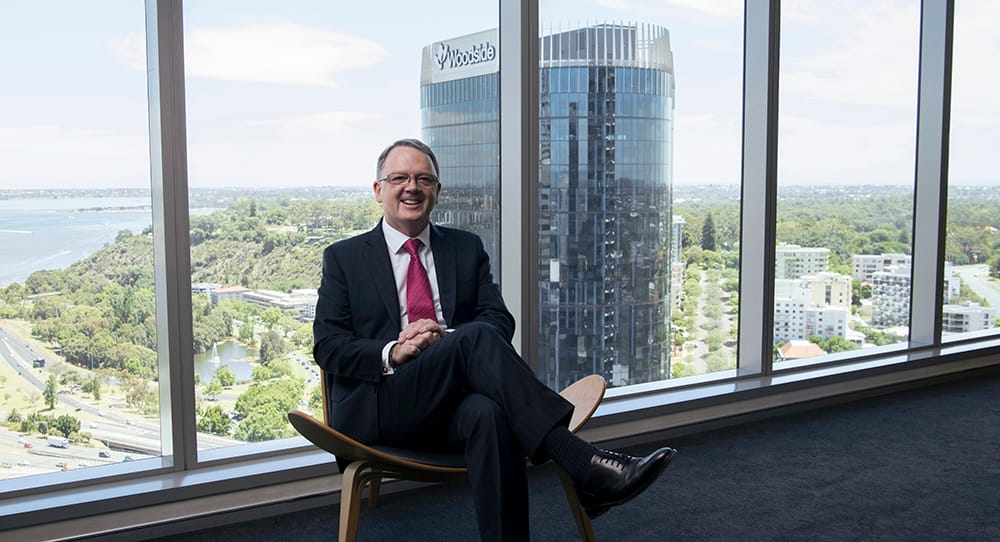
Peter Coleman says new technologies such as artificial intelligence, robotics and deep learning are propelling Woodside – Australia’s largest independent oil and gas company – down two parallel paths.
One is driving efficiency in Woodside’s “hard pipe” – its core engineering functions such as extraction and compressions – on an ever-grander scale. The other is digital and, together, Coleman says they are changing Woodside’s focus from its assets to its people.
Industry game-changers, such as added competition from US shale gas hitting the world market, are fuelling the pace of change.
“We’re putting different types of technology together, and moving from being an oil and gas company to a tech company that specialises in oil and gas,” he says.
“We are changing our focus from assets to people, so that we can move to wherever the world is moving to, and quickly. I’ve got to keep up with what’s happening in the digital world, with renewable energy, with companies like Amazon. We have to make sure we’re swimming with them.”
His “we” refers to Woodside’s staff of 3500 spanning 11 countries, so his leadership role calls for the kind of confidence he first felt in his undergraduate years studying civil engineering and computing science at Monash University.
The experience introduced him to writing code to solve real-time problems in a practical learning environment he relished.
“Monash has been an important part of my life journey. It showed me you could take hard work and effort, and structure that to enable you to look at problems in a completely different way, and I am grateful for that.
“Earning a degree gave me the confidence to take on challenges, and some of those lessons I learnt along the way have stuck with me.”
One of his challenges has been to ensure that rapid change doesn’t swamp principles including respect, integrity, discipline, excellence, working together and sustainably, set out in the Woodside Compass, drafted in 2012 to guide the company as it strives to become a global leader in upstream oil and gas.
“It tells us who we are, where we’re going, and how we’ll get there, and I distil what’s going on around me to those principles, and test myself against them every day,” he says.
Coleman says good leaders need a strong set of principles, because organisations want consistent behaviours, and principles require conviction.
“The best CEOs are the ones that are willing to lose their jobs if they have to in order to stay true to their principles.”
Coleman says his ongoing commitment to a raft of organisations has informed his own, and Woodside’s, position since he joined the company in 2011.
Those organisations include the Australia Japan Business Co-operation Committee, the Australia–Korea Foundation and the Advisory Group on Australia–Africa Relations.
Coleman is also involved with Monash and is on the board of the Business Council of Australia. And despite being a supporter of Victorian-based AFL St Kilda Football Club, he served three years as a commissioner of West Australian Football.
“Personally, I get a lot of satisfaction through being able to help and support and do what I can within these organisations,” he says.
“At a business level, it’s good for the brand to understand how others think, and what’s going on in the world, and, at the professional level, I need to stay grounded.”
Coleman says professional engagements outside the company require an open and honest outlook, and the willingness to take on board what others have to say.
“That can be illuminating and confronting; the danger you have in a large industry like oil and gas is you can get locked in, and the attitudes you have can become self-reinforcing,” he says.
“It makes you ask: ‘Are we, as a business, doing the right things?’ If we are not, we may need to change. Leaders are not always right, and the strength of a true leader is humility.”
Good leadership, he says, is aided by an appreciation of the contribution of everyone in the company, which in his industry might mean enduring a sweltering summer in Western Australia’s Karratha and an Alaskan winter.
“Everybody needs to know how to make the team sweep the floor, and that’s why you might find me sweeping the floor from time to time,” he says.
As a Monash graduate in 1983, Coleman was offered a job in consulting, another in mining, and a third as a drilling engineer in Bass Strait. He has never regretted accepting the latter.
“The industry is a meritocracy, and it’s been fabulous to a country kid like me from a working-class background.”





